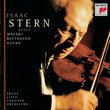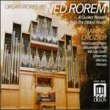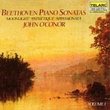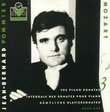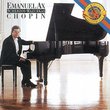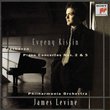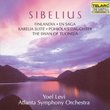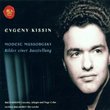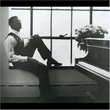| All Artists: Claude Debussy, Gustav Mahler, Claudio Abbado, Lucerne Festival Orchestra, Eteri Gvazava Title: Abbado Conducts Mahler & Debussy Members Wishing: 1 Total Copies: 0 Label: Dg Imports Release Date: 7/19/2004 Album Type: Import Genres: R&B, Classical Styles: Historical Periods, Modern, 20th, & 21st Century, Symphonies Number of Discs: 2 SwapaCD Credits: 2 UPC: 028947750826 |
Search - Claude Debussy, Gustav Mahler, Claudio Abbado :: Abbado Conducts Mahler & Debussy
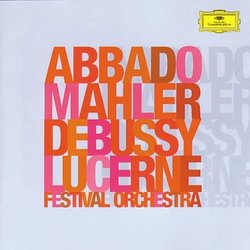 | Claude Debussy, Gustav Mahler, Claudio Abbado Abbado Conducts Mahler & Debussy Genres: R&B, Classical |
Larger Image |
CD DetailsSimilarly Requested CDs |
CD ReviewsA triumph in wonderful sound Larry VanDeSande | Mason, Michigan United States | 02/25/2005 (5 out of 5 stars) "This is Abbado's third go-round recording the "Resurrection" symphony. His first recording got generally good grades from critics and his recent Mahler recordings on the DG label have by and large been well-accepted critically and at the cash register. The current issue does nothing to deter any of these trends and is, for me, a contender for best recording of these two works. "La Mer" opens the first disk in this two-disk set in a performance that is well-played, sonically immediate and perhaps not as subtly nuanced as your favorite version of the music. I mentally compared it to the Stokowski recording on London and thought it quite a bit more literal in its approach. Still, the Swiss orchestra plays very well for Abbado and the end product is a worthy rendering of Debussy's suite for the sea. In the major work, the Mahler Symphony No. 2, Abbado and the orchestra begin with such a mild opening expression that I feared this would be "little" Mahler played on a small scale. But by the end of the opening sequence, at the 2-minute mark, it is apparent this is going to be a full throated version in keeping with the legend of the music. True to his nature, Abbado proves to be a chameleon of tempo. By the 3:50 mark the orchestra has supercharged its approach, then back to a more moderated -- even slow -- attack at 4:20. Throughout the first movement the orchestra's brass and woodwinds blaze with the passion necessary to carry out Mahler's intent. By the 8-minute mark the exposition has become even more monumental. By 12:30 he is back to a more monolithic approach, before ending this section in a whirlwind of drama and passion. Abbado is more conventional in tempi during the second and third movements, where the orchestra continues to play exceptionally well. Abbado keeps the whole thing moving consistently in the right direction. His dramatic opening is followed by changing moods in the second and third movements, the ethereal "Urlicht", and great finale, where he is in complete control of the orchestra, choir and soloists. His choral finale, coming behind a beautiful version of Mahler's musical picture of bird calls (flutes) over offstage hunting horns, is thunderous and immense, befitting its vocal calling, "With wings, which I have won, I shall soar upwards, I shall die, to live!" I had goose flesh at the end of the choral section leading into the orchestral closing. The audience must have been stunned by the gigantic closing, for a couple seconds pass before the first "bravo" appears from the crowd, whose applause is worthy of the occasion. My sole complaint from this issue is the lack of CD tracks, especially in the final movement where there is one track covering 34 minutes. This seems too brief to me in digital 2005. Kaplan's second recording, made a few years ago on DG, had 8 or 10 tracks in the final movement alone. Otherwise, this is one of DG's very best recordings, especially for a concert, with brilliant highs and exceptional depth in the lower range. The audience was either asleep most of the time or utterly complaint, for there is nary a whisper from them during the musicmaking sequences. In addition, the orchestra sounds great all the time and the sound stage is three dimensional and completely natural. This is one of the only recordings of the this music I've heard where the bells are clearly audible and forward in the final movement. DG recorded these works during a concert in Lusanne in 2003 featuring the Lucerne Festival Orchestra, an unnamed choir and soloists Eteri Gvazava, a soprano, and Anna Larson, a contralto who teamed with Abbado in his recent recording of Mahler's Symphony No. 3 on the DG label. Anna Larson is wonderful in the "Urlicht" section and sings well in the choral finale. I can't say as much for Eteri Gvazava, whose big voice is hidden behind an uncontrollable vibrato that may or may not be appropriate for this heaven-storming music. The choir sing well although I wouldn't understand what they were saying if I didn't have the notes. Peter Hagmann's notes, subtitled "A memoir on the summer of 2003", are skimpy. They discuss the Lucerne summer festival and the orchestra with no history of the music, the composer or performers. The booklet includes an English translation of the choral music and a list of orchestra players. The chorus master gets a credit even though the chorus is never named. I don't very much like Mahler 2's that come on two CDs and my preferred version is the Abravanel recording from Vanguard. This version is better than the last two I bought -- by Stokowski (one CD) and Kaplan's second recording on DG. I think this version is more consistently dramatic than Kaplan's recent offering and the sound is a world improved from the mono Stokwoski recording from the 1960s. At 81 minutes, Abbado's "Ressurection" symphony is more direct than Kaplan's 85-minute excursion, which actually seems slower than that. The Lucerne players are every bit the equal of Kaplan's Vienna Philharmonic. I've only heard it once so I'll have to listen several more times before I decide whether or not this version is a keeper in the long term. But after one hearing, I think it is fair to say this new recording by Abbado is in league with all the great versions people have discussed in the stereo era. Now, there is only one questions left unanswered about this issue: what is with that CD cover?!?!" Exceptional achievement Leonardo | Argentina | 10/05/2005 (5 out of 5 stars) "You have here the most representative of the works of the "fin - de - siecle" years. Are they the greatest? Mahler composed better things like the 3rd symphony, but nobody can deny his second is his "greeting card" for a Mahler newcomer, a more appropiate work to fulfill this role than his first symphony. And about Debussy I don't know. Sure in the CD there is more room for the famous Prelude. The readings are top notch. Debussy is truly atmospheric and "impressionistic"; Mahler sounds in the German tradition instead, but with full and due respect for transparency. The greatest sound possible. Debussy here is great!! And listen to how differently Abbado makes the orchestra sound in each work!! CD 1 ends with the 2nd symphony mov (ideal, for there must be a pause after mov 1, as written. This is not so obvious in Klemperer's 65` recording. Perhaps Klemperer is wiser but Mahler needs great sound t make a proper impact and if Klemperer sounds good for its age, pales when looking at this Abbado. For me the weak moment of Klemperer is the final and apotheosic bars, because lacks a bit of monumental scope which is brilliantly caught here. Yes may be a matter of a few decibels but fore me those make difference. Abbado may not be better than Klemperer overall but still great, with much better sound and with such an extra souvenir as La Mer, all costs the price of 1 CD (in my country). The playing is superb. Surprisingly Classicstoday.com gave bad reviews, against all the current of prizes and rave reviews given by other critics. In fact, so good critics is not an accident, is the reward for such an intense work. If you want to begin to explore that golden age of "fin - de - siecle" or just love catching truly offers, buy this." HD Performance of Resurrection Symphony!! Scriabinmahler | UK | 11/29/2008 (5 out of 5 stars) "Usually, I'm not easily impressed by Abbado's superb yet tame live recordings made recently, but I was really struck by this incredibly sumptuous and animated live performance by the hand-picked elite musicians of Lucerne Festival Orchestra. Every phrase and every bar is played with utmost commitment and musicality as if each instrument is playing solo in a concerto!
Take for example, the lovely flute part just before the chorus joins, the subtlety and expressiveness of the instrument is simply revelatory, and every other instrument and singer does the same all the way! Even bass and percussion part has extra bite and more character. Anna Larsson and Eteri Gvazava too contribute their deeply moving and heart-felt singing to this monumental performance. Abbado has firm grip on overall architecture of the symphony, while allowing all musicians freedom to express their part to the full. That creates musical equivalent of High Definition presentation of the work. You will re-discover amazing richness and lavishing colours of this symphony and will marvel at Mahler's genious and vision. The final apotheosis is not the grandest of all recordings (notably Slatkin's larger than life account and Stokowski's gigantic Prom live on BBC Legend), but nobly controlled in such a way that the maximum impact is achieved. It must have been awe-inspiring occasion for everyone present judging from the eruption of the applause. My only complaint is that it sounds rather all too perfect for real! Coupled with equally awesome account of La Mer." |

